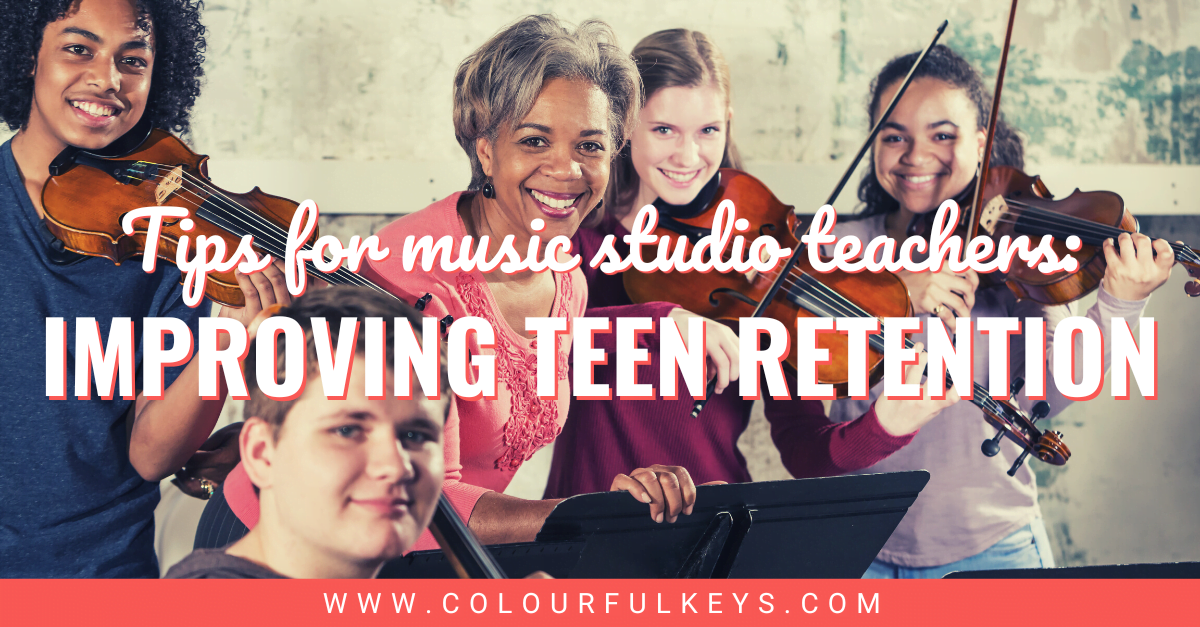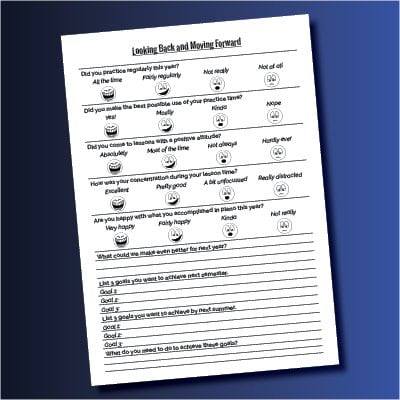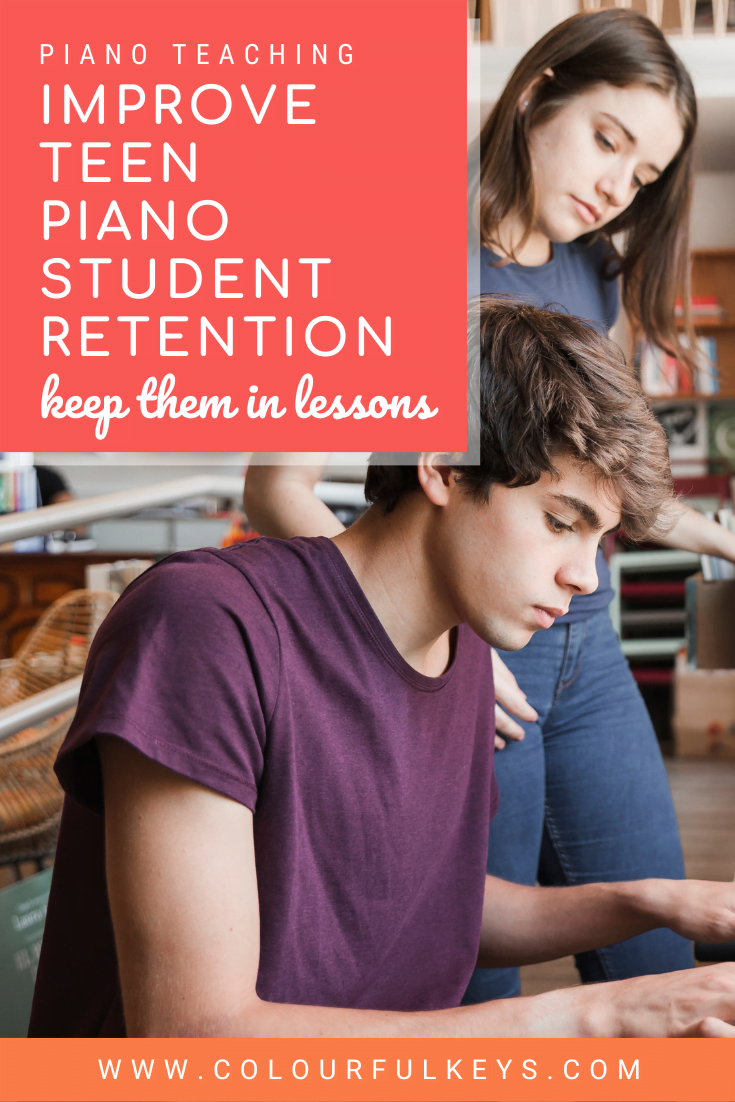
This blog post about improving teen music student retention was written by Ruth McAdoo. Ruth has a degree in Theology/Vocal Performance from Appalachian Bible College and has been teaching creative piano, violin, voice and ukulele students near St. Louis, Missouri USA for the last 5 years. When she’s not teaching, you can find Ruth listening to film scores, mixing up a fresh batch of waffles or rollerblading into the sunset with her husband Micah.
When I started teaching, I had my dream studio: a majority of students who were 5 – 9 years old. To me, little kids are the absolute best. They have so much imagination and so many endearing little qualities … and only one problem, in my starry-eyed view:
They grow up.

When virtually overnight my adorable 2nd graders had all turned tall and moody, it threw me for a loop.
As I’ve re-learnt how to teach a new age group, I’ve discovered the value of the old statement “Honesty is the best policy”.
Teens want us to be honest and straight up with them – to feel like they are equals, and have ownership over their own musicianship.
Here are 3 lessons I’ve learnt over the past few years that have really improved my teen music student retention.
Lesson 1: Be on Their Side
Let me start with a disclaimer: Honesty can backfire.
Ever critique or give feedback to a teen student, only to have them justify their action? Or worse, wither away in discouragement?
As teachers, we feel that it’s obvious we’re on our students’ side, but we need to make sure they know that.
Here’s how you can demonstrate you’re their coach and advocate, not their disciplinarian.
Keep Things at the Same Level
Honesty is really just saying what’s true, right? And what’s true is what’s real: the facts.
With younger students I may play silly games, make up rhythm chants, or pretend we’re floating on a cloud.
They love it, and I love it.
But as they grow older, there comes a day when we’re playing make believe and I can see they feel bored, belittled or just plain confused. I can hear them thinking, “What’s she really trying to get me to do?”
It’s at this point that I cut the jargon and tell them “you need to play that section more lightly.”
And they do.
If you’re a silly teacher like me, you have a hundred fun, goofy ways to talk about those concepts, and my littles love them.
But my teens appreciate very few of them.
Teens respond better when you just say it like it is, and then you can dig into the work – together.
Work as a Team
I love asking my students to brainstorm with me.
Practise this approach by first isolating an issue, for example, “That section feels rushed”. Then, work together to generate solutions by saying, “Any ideas how to keep the tempo from accelerating too much?”
I’m usually delighted by the ideas my teens throw out. Some generate a creative response, like remembering the feeling of trying not to run down a steep hill. Some generate a less-creative but equally effective response, like setting the metronome to a slow tempo and gradually bringing it back to speed.
Both are completely acceptable.

Offer suggestions and options if they have difficulty finding a solution. By giving them ownership of that final approach, they’re often more willing to work that much harder to overcome challenges.
The cherry on the top is that whatever solution your teens choose, it’s generally a strategy that suits their learning style best.
Make it fun!
With all this talk of ownership and stuffy, adult conversation, I’m not saying we take all the humour out of our teaching. What fun would that be, either for them or for us? 😉
Finding the fun in a situation is a great way to diffuse tension and create rapport.
My violin teacher in high school was an older Russian man who always had a pipe-smoke aroma, a twinkle in his eye and absolutely the most engaging, disarming manner.
Whenever I would play something wrong he would stop me, lean in, and speak in a hushed tone to my fingers.
His instructions to them would vary, but by using humour to instruct my fingers rather than me, he had this magical way of dispelling the burden of letting him down.
Those pesky fingers again! How could they? And we’d both have a good laugh.
He often made the same corrections over and over and over during the years that I studied with him, but that simple use of humour went a long way in keeping me from being discouraged as we set to work together – my teacher, my fingers and me.
Lesson 2: Be Their Mentor
In my experience, transforming your relationships with teen piano students from instruction-giving teacher to supportive and encouraging mentor will work wonders for retention.
When students are younger, we set goals for them which we help them progress towards. But as they age, we need to be honest about what skills they need to improve on and invite them to be clear about what their personal goals are.
After all, most teens want to aim for challenging goals and be successful. Help them take an honest look at themselves so they can take ownership over the goal-setting process.
There are many ways you can approach this.
Give Them Your Prognosis
If you have a teenager who’s struggling to keep the beat, and you’ve been hesitant to tell them, just bite the bullet and do it.
You don’t just want them to feel sort of successful – you want them to actually be successful.
Be specific, be kind and be direct about the skills your teen music students need to work on.
Don’t forget to invite their input. Honesty is a two-way street, after all. So remember to welcome your students’ thoughts on what they think the root issue could be, then brainstorm together on some measurable ways for them to work towards that goal.
Ask for their aspirations and encourage them to dream big!
You’re probably already doing this one, but it’s so important that it bears repeating: Ask your teen music students what they would like to work on.
That’s not limited to just what songs they want to play (although that is so important, too.) I mean learning about their overall goals.
- Would they like to become more comfortable improvising?
- Do they want to crush their next piano exam?
- Is sight reading important to them, so they can move through more repertoire?
When students have that big goal in mind of what they want, it can open up the path to try things they would otherwise roll their eyes at.
If we truly take our teen music students’ personal goals seriously in our assignments, this can really help with teen student retention in our music studios.
Here are some examples from my own studio:
- Assign a piece your student doesn’t love, but then explain this will help them take their Baroque ornamentation up a notch for their next exam. That way they willingly work at it.
- Encourage a tentative teen to improvise over a certain chord progression this week, showing them how this progression is going to show up in the pop song they’re excited to start next week.
- Introduce a classical piece outside your teen’s favourite video-game-score genre, demonstrating to them how character motifs in scores have their roots in classical opera.
It’s all about buy-in, ownership and helping students see that we take their goals seriously and want to help them be as successful as possible.
Make It Concrete
Finally, make your teen students accountable by writing down goals and checking in on them regularly. Research has proven that what gets written, gets accomplished.
This self-evaluation form from the Vibrant Music Teaching members’ printable library is a great tool for helping your teen students articulate their personal goals. Enter your info below and I’ll send you a copy for free.

Subscribe to the newsletter and get the student self-evaluation form.
Enter your details to subscribe to the newsletter for piano teachers with information, tips and offers.
I hate spam as much as you do! I will only send you emails related directly to piano teaching and you can unsubscribe at any time.
Already a member of Vibrant Music Teaching? Download this goal-setting worksheet from the library. Not a member yet? Vibrant Music Teaching has hundreds of printable resources for you to use, but that’s not all! Learn more about the membership and join today.
Lesson 3: Set an Example
Honesty and hypocrisy just cannot coexist. Teens can sense when we’re being fake. They want you to genuinely care about them, but they also want to see the authentic you.
Why should your teen piano students be real with you if you’re not real with them?
Here are a few ways I’ve tried to implement more authenticity in my studio life, with an aim of improving my teen music student retention.
Invest in Your Own Practice
Are your practising days so far behind you that you can’t even remember the last time you worked on something just for yourself?
I noticed that when the practice strategies I shared were starting to get a little stale, it was because I was telling my students to do things I didn’t do … the age-old mantra of, “Do as I say, not as I do.”🤦🏻♀️
Incorporating regular practice, trying different practice strategies of my own and exploring more music myself has made me a more authentic teacher. It gives me the authority to work alongside the struggling teen students in a more empathetic way.
Always Admit What You Don’t Know
There’s no point bluffing.
Just don’t do it!
If you don’t know something, either look it up together or tell the student you’ll find an answer and get back to them (and actually follow through, of course.)
If we want to encourage our students to be honest about what they know or don’t know, we need to lead by example and be honest with them in the same way.
Normalise Inviting Feedback
There’s a time and a place, as with everything … but why not invite feedback from your teens instead of just from the parents?
You could informally work these questions into conversation, hand out a survey, or somewhere in between:
- What parts of our lessons help you the most?
- If we were to cut out one aspect of our lessons to give us more focus on the other areas, what would you cut?
- If we were to add one new area of study to our lessons, what would you add?
Let’s be honest: teens do everything on their phones these days. So if you want thoughtful responses, consider sending out a survey they can fill out electronically using Google docs or a free service like SurveyMonkey. You could even list several areas of your teaching and ask them to give you a score out of 10, with a space for comments on each.
This is a pretty basic starting place; there are so many other things we could ask our students’ opinions on. And if we listen, truly listen, to what they have to say, how would that change your teens’ experience with music?
How honest are you with teens in your music teaching studio?
Do you struggle with “saying it straight” with your teens? How do you think changing your approach could impact your teen music student retention? Let me know in the comments below.
For more help with keeping your teens engaged and excited about music lessons, check out the ‘Older Students’ section of Nicola’s Planning Lessons hub page.
